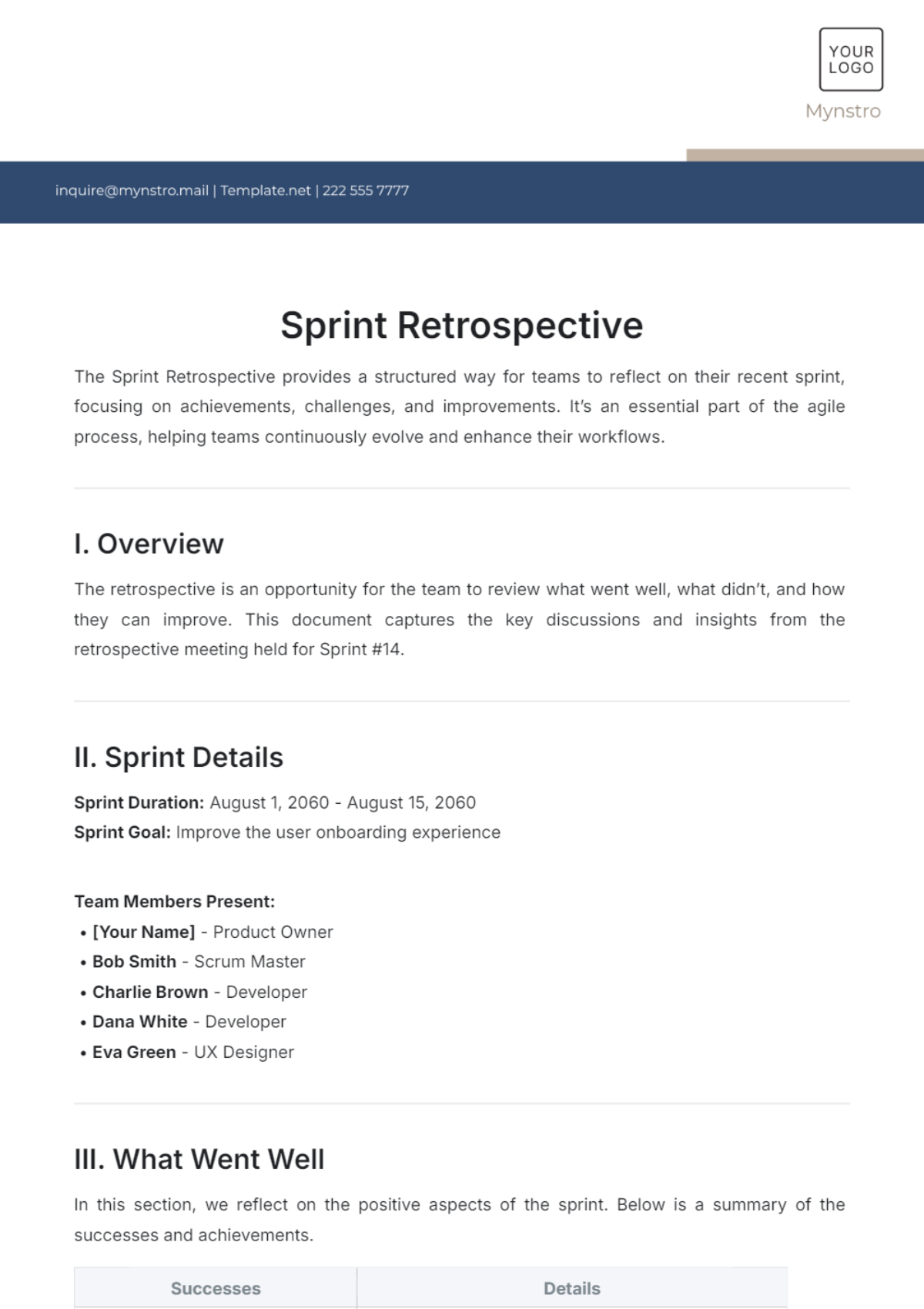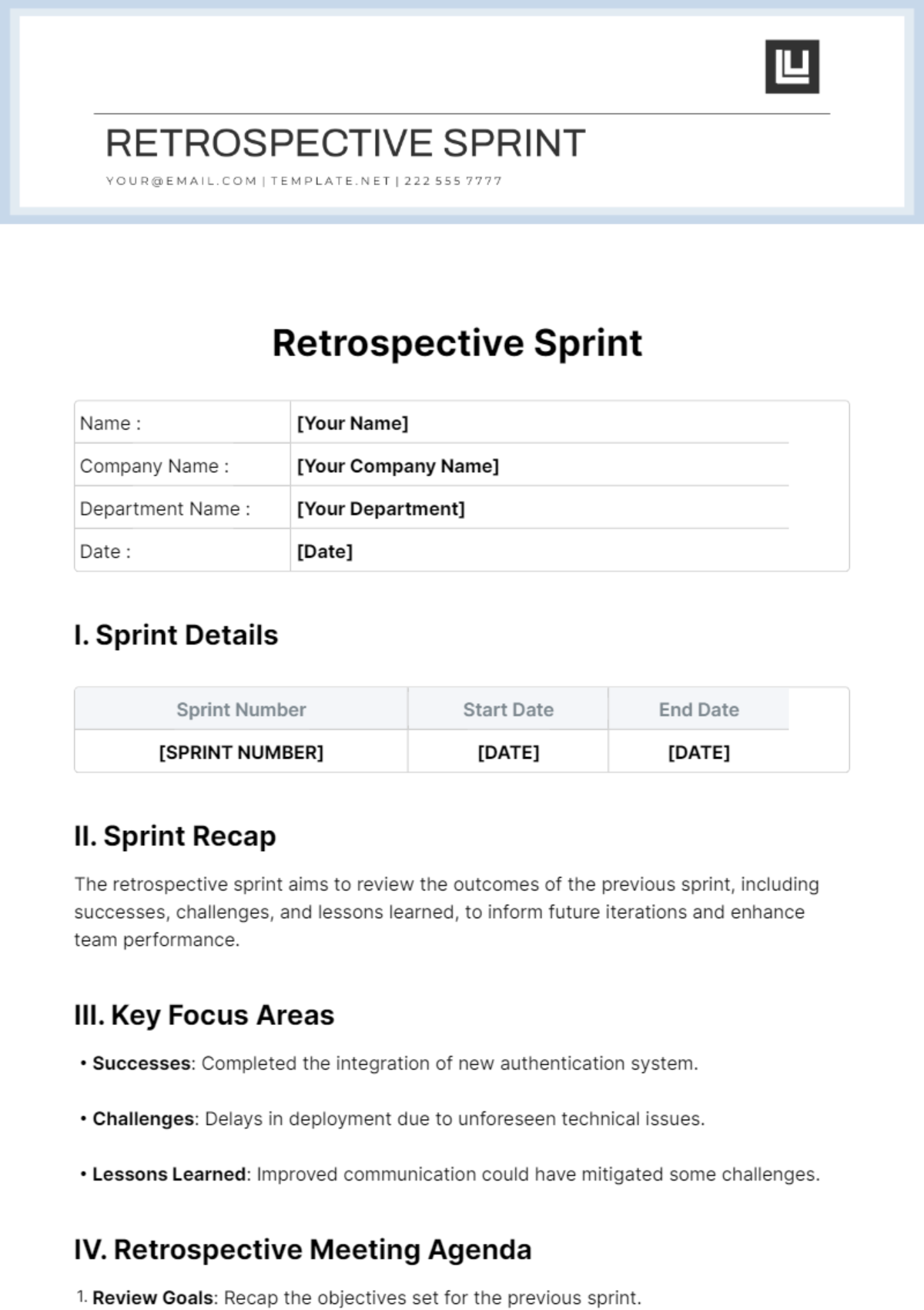Sprint Retrospective
The Sprint Retrospective provides a structured way for teams to reflect on their recent sprint, focusing on achievements, challenges, and improvements. It’s an essential part of the agile process, helping teams continuously evolve and enhance their workflows.
I. Overview
The retrospective is an opportunity for the team to review what went well, what didn’t, and how they can improve. This document captures the key discussions and insights from the retrospective meeting held for Sprint #14.
II. Sprint Details
Sprint Duration: August 1, 2060 - August 15, 2060
Sprint Goal: Improve the user onboarding experience
Team Members Present:
[Your Name] - Product Owner
Bob Smith - Scrum Master
Charlie Brown - Developer
Dana White - Developer
Eva Green - UX Designer
III. What Went Well
In this section, we reflect on the positive aspects of the sprint. Below is a summary of the successes and achievements.
Successes | Details |
|---|---|
User Onboarding Features | New features were well-received by users. |
Team Collaboration | High levels of collaboration and communication. |
Timely Delivery | All major tasks were completed on time. |
Effective Testing | The new testing procedures were successful. |
Positive Feedback | Received positive feedback from stakeholders. |
IV. Challenges Faced
Here, we analyze the difficulties encountered during the sprint and their impacts on the team’s progress.
Challenges | Impact |
|---|---|
Scope Creep | Added unplanned work, leading to delays. |
Resource Constraints | Limited availability of resources. |
Communication Gaps | Occasional miscommunication within the team. |
Bug Fixing Delays | Some bugs took longer to fix than anticipated. |
Stakeholder Feedback Delays | Delays in feedback affected the timeline. |
V. Action Items
To address the challenges and build on the successes, the following action items have been identified:
Manage Scope More Rigorously
Ensure all additional features are properly vetted and prioritized.Improve Resource Planning
Assess resource needs more accurately in future sprints.Enhance Communication Channels
Implement regular check-ins to minimize miscommunication.Streamline Bug Fixing Process
Develop a more efficient process for handling bugs.Accelerate Stakeholder Feedback
Set clear deadlines for feedback to avoid delays.
VI. Lessons Learned
This section captures the key insights gained from the retrospective, which will guide future sprints.
Importance of Early Scope Definition
Defining the scope early helps in better resource planning and time management.Value of Clear Communication
Regular and clear communication is crucial for team alignment.Efficiency in Handling Feedback
Timely feedback from stakeholders is essential for maintaining sprint momentum.Adaptability to Challenges
Being flexible and adaptive to unforeseen challenges can mitigate their impact.
VII. Next Steps
The team will implement the action items identified and monitor their effectiveness in the next sprint. Regular follow-ups will be scheduled to ensure these improvements are achieved.
Schedule Follow-Up Meeting
Date: September 1, 2060
Time: 10:00 AM
Location: Conference Room BDistribute Summary Report
The report will be sent to all team members and stakeholders by August 20, 2060.Plan for Sprint #15
Kick-off meeting to be scheduled on August 25, 2060.
For further information or queries, please contact:
[Your Company Name]
[Your Company Email]
[Your Company Number]
[Your Company Address]
For additional assistance, you can reach out to [Your Name] at [Your Email].


